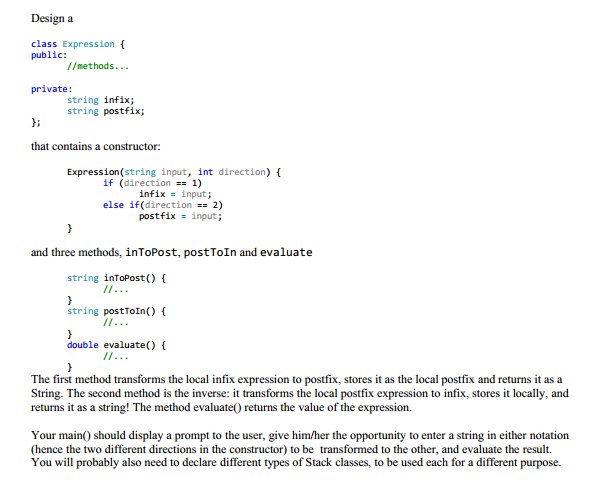Question
Using C+, Design a class Expression { public: //methods... private: string infix; string postfix; }; that contains a constructor: Expression(string input, int direction) { if
Using C+, Design a
class Expression { public: //methods... private: string infix; string postfix; }; that contains a constructor: Expression(string input, int direction) { if (direction == 1) infix = input; else if(direction == 2) postfix = input; } and three methods, inToPost, postToIn and evaluate string inToPost() { //... } string postToIn() { //... } double evaluate() { //... }
The first method transforms the local infix expression to postfix, stores it as the local postfix and returns it as a String. The second method is the inverse: it transforms the local postfix expression to infix, stores it locally, and returns it as a string! The method evaluate() returns the value of the expression. Your main() should display a prompt to the user, give him/her the opportunity to enter a string in either notation (hence the two different directions in the constructor) to be transformed to the other, and evaluate the result. You will probably also need to declare different types of Stack classes, to be used each for a different purpose.

Design a class Expression { public: //methods... private: string infix; string postfix; that contains a constructor: Expression(string input, int direction) { if (direction == 1) infix input; else if(direction == 2) postfix = input; and three methods, inToPost, postToIn and evaluate string intoPost() { //... string postToIn() { double evaluate() { 11. The first method transforms the local infix expression to postfix, stores it as the local postfix and returns it as a String. The second method is the inverse: it transforms the local postfix expression to infix, stores it locally, and returns it as a string! The method evaluate() returns the value of the expression. Your main() should display a prompt to the user, give him/her the opportunity to enter a string in either notation (hence the two different directions in the constructor) to be transformed to the other, and evaluate the result. You will probably also need to declare different types of Stack classes, to be used each for a different purpose
Step by Step Solution
There are 3 Steps involved in it
Step: 1

Get Instant Access to Expert-Tailored Solutions
See step-by-step solutions with expert insights and AI powered tools for academic success
Step: 2

Step: 3

Ace Your Homework with AI
Get the answers you need in no time with our AI-driven, step-by-step assistance
Get Started


